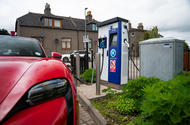Research suggests few operators are meeting the government-suggested 99% reliability benchmark
Data from ZapMap covers 12 of the UK’s largest rapid operators, with one company showing 32% being out of order
A survey for Autocar has found that the reliability of rapid electric car charging points (classed as 50kW and above) varies markedly between different providers, with one company showing more than 30% as being out of order.
The best, Fastned, scored 100% reliability, while the poorest performing, GeniePoint, registered faults on 32% of its devices, according to the figures obtained by FastCharge.
FastCharge’s analysis across 12 of the UK’s largest rapid charging networks – which cover more than 75% of all rapid devices – suggests very few operators are meeting the 99% reliability record that has been suggested by the government. Based on new research of Zap-Map data, only newcomers Fastned and MFG EV Power were found to hit the government target.
Long-running networks perform less well, with BP Pulse having 7% broken and Pod Point, often found at supermarkets, having 13% out of order. Combined, these networks represent more than 1000 devices.
At the time of the survey in October 2022, the networks Osprey, Gridserve and Instavolt did better, with only 3-4% of chargers reported as out of order. Meanwhile, Tesla’s network – which remains largely private – was recorded as having 5% of its Superchargers unavailable.
The table is propped up by Ionity, Shell Recharge and GeniePoint.
This follows government action designed to tackle the unreliability of the charging network. Earlier in 2022, it announced plans to regulate the uptime of rapid charging devices and, although the laws have yet to be enacted, when they arrive all public chargers delivering more than 50kW are expected to have 99% reliability.
Given more than a third of motorists don’t own a driveway and will have to rely entirely on public chargers, infrastructure that is accessible and reliable is becoming critical.
The same survey found that the number of rapid chargers per car is actually falling, as sales of electric cars continue to accelerate.
| Rapid charger reliability league table | |
|---|---|
| Network | OUT OF ORDER % |
| Fastned | 0% |
| MFG EV Power | 1% |
| Gridserve Electric Highway | 3% |
| Instavolt | 3% |
| Osprey | 4% |
| Tesla Supercharger (public and Tesla only) | 5% |
| BP Pulse | 7% |
| ChargePlace Scotland | 7% |
| Pod Point | 13% |
| Ionity | 22% |
| Shell Recharge | 25% |
| GeniePoint | 32% |
| (Survey undertaken 29/10/2022 of Zap-Map by The Fast Charge) | |
Are there enough cars to each charger?
At present, there are around 570,000 battery-electric cars on British roads – a population that’s increasing by about 60,000 every three months. As such, questions remain about whether the charger roll-out is keeping up.
In the UK there are currently 34,637 public chargers, with 2626 new devices getting installed in the past three months (421 of which were rapid chargers). Although this is the biggest quarter on record, there are reports of concerns in some areas that we are already experiencing a ‘charging drought’, where there are too many EVs to each public chargepoint.
As of this month, there are now 17 electric cars to each public chargepoint. But for solely rapid chargers, that becomes about 90 cars to each charger – double what it was two years ago.
| BEVs per EV Charger | BEVs per Rapid Charger | |
|---|---|---|
| Q1 – 2019 | 6 | 33 |
| Q2 – 2019 | 5 | 33 |
| Q3 – 2019 | 6 | 34 |
| Q4 – 2019 | 6 | 35 |
| Q1 – 2020 | 6 | 38 |
| Q2 – 2020 | 7 | 40 |
| Q3 – 2020 | 8 | 47 |
| Q4 – 2020 | 10 | 53 |
| Q1 – 2021 | 10 | 56 |
| Q2 – 2021 | 12 | 62 |
| Q3 – 2021 | 13 | 67 |
| Q4 – 2021 | 14 | 77 |
| Q1 – 2022 | 15 | 84 |
| Q2 – 2022 | 16 | 86 |
| Q3 – 2022 | 17 | 90 |
Fastest-growing regions
According to the latest government data, the West Midlands and Yorkshire and Humber are the fastest-growing regions for EV charger installations – recording a 16.7% and 13.9% uptake respectively.
To date, London has been the region experiencing the quickest growth, though in the third quarter of 2022 it managed to increase by only 5.2%. But given a third of all charging devices are in the capital, it is inevitable that growth will be proportionally slower.
In a worrying sign, the number of installations in the North East region reduced by 1.1% over the past three months. Although, on the other side of the country, the North West boosted its numbers by 184 new devices and had the highest growth of rapid devices compared with other regions.
Those planning road trips across the famous North Coast 500 in Scotland are also in luck, as the country noted a strong 9.5% uptake in devices, adding to its already high number of EV chargers.
Tom Riley
Source: Autocar
